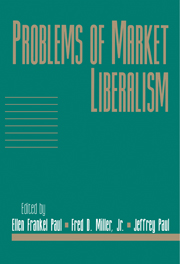Book contents
- Frontmatter
- Contents
- Introduction
- Acknowledgments
- Contributors
- Why All Welfare States (Including Laissez-Faire Ones) Are Unreasonable
- Measuring Opportunity: Toward a Contractarian Measure of Individual Interest
- Deontic Restrictions Are Not Agent-Relative Restrictions
- Why Even Egalitarians Should Favor Market Health Insurance
- Affirmative Action and the Demands of Justice
- The Dual Role of Property Rights in Protecting Broadcast Speech
- Regulation of Foods and Drugs and Libertarian Ideals: Perspectives of a Fellow-Traveler
- Profit: The Concept and Its Moral Features
- Natural Property Rights: Where They Fail
- Toward a Libertarian Theory of Class
- Libertarianism as if (the Other 99 Percent of) People Mattered
- On the Failure of Libertarianism to Capture the Popular Imagination
- Imitations of Libertarian Thought
- Index
The Dual Role of Property Rights in Protecting Broadcast Speech
Published online by Cambridge University Press: 26 January 2010
- Frontmatter
- Contents
- Introduction
- Acknowledgments
- Contributors
- Why All Welfare States (Including Laissez-Faire Ones) Are Unreasonable
- Measuring Opportunity: Toward a Contractarian Measure of Individual Interest
- Deontic Restrictions Are Not Agent-Relative Restrictions
- Why Even Egalitarians Should Favor Market Health Insurance
- Affirmative Action and the Demands of Justice
- The Dual Role of Property Rights in Protecting Broadcast Speech
- Regulation of Foods and Drugs and Libertarian Ideals: Perspectives of a Fellow-Traveler
- Profit: The Concept and Its Moral Features
- Natural Property Rights: Where They Fail
- Toward a Libertarian Theory of Class
- Libertarianism as if (the Other 99 Percent of) People Mattered
- On the Failure of Libertarianism to Capture the Popular Imagination
- Imitations of Libertarian Thought
- Index
Summary
Congress shall make no law … abridging the freedom of speech, or of the press ….
First Amendment, U.S. ConstitutionFreedom of the press is guaranteed only to those who own one.
A. J. LieblingWHO SHOULD THE FIRST AMENDMENT TO THE U.S. CONSTITUTION CONSTRAIN?
The connection between property rights and free-speech rights has most often surfaced in conflicts between the two. In his classic formulation of the problem, journalist A. J. Liebling mocked the First Amendment's free-press clause by noting that ownership of a printing press was required in order to actually enjoy the constitutional protection. In an important case decided in 1980, Pruneyard Shopping Center v. Robins, the U.S. Supreme Court ruled that a group wishing to circulate political petitions at a shopping center had a constitutional right to do so. There the Court found that such governmentally enforced access to private property did “not amount to an unconstitutional infringement of [the shopping center owners'] property rights under the Taking Clause of the Fifth Amendment ….”
In either of the two examples, Liebling's much-quoted aphorism or the Supreme Court's adjudication of a real-world conflict, the concern expressed is that free speech may be limited by “private censorship.” Where those who own property used for communication (whether printing presses, radio or television transmitters, cable TV plant, software, telephone or computer networks, sidewalks in a shopping mall, or satellite facilities) are free to exercise editorial control over what “content” is communicated, the argument is made that affirmative government action is required to limit the editorial discretion of the owner.
- Type
- Chapter
- Information
- Problems of Market Liberalism , pp. 176 - 208Publisher: Cambridge University PressPrint publication year: 1998



